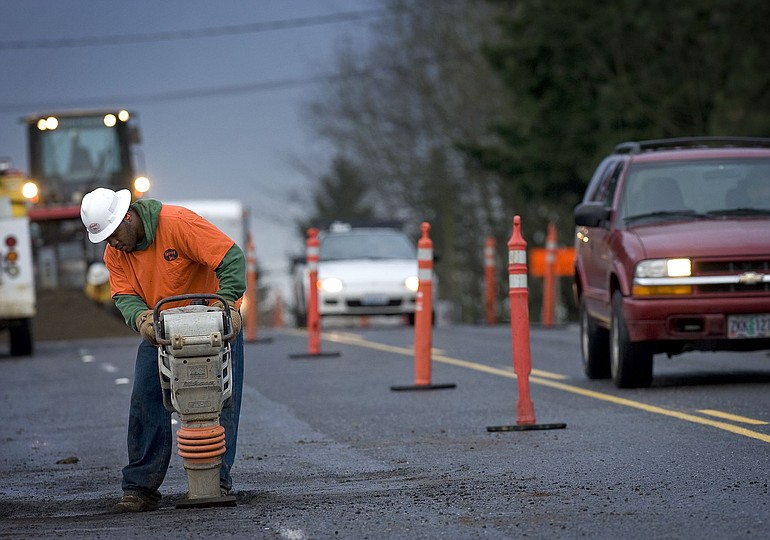Not many people are fans of the jackhammers and traffic delays that accompany new road construction projects — but Vancouver city officials are beginning to warn that the public might like the opposite even less.
The city’s capital road fund, which pays for all new roads and improvement projects, is exhausted for the first time in at least 30 years. A few projects, such as the first phase of widening Northeast 18th Street and providing access to the waterfront from downtown, are being finished. Then, unless more money is found, all the roads in Vancouver have essentially hit a dead-end, city Transportation Policy Manager Thayer Rorabaugh told the city council Monday.
The solution, he said, could come in the form of a new 10-year Transportation Benefit District, which may include adding $20 to vehicle license fees to raise $2.1 million a year to “breathe life” back into new road projects.
“Certainly a $2 million per year program isn’t much,” and represents the equivalent of three traffic signal improvements, Rorabaugh said. “But it allows us to establish ourselves with the community, and establish a program that is extremely transparent.”
Rorabaugh’s proposal to the council was just a suggestion. Under state law, the city council may form a Transportation Benefit District for up to $20 per license tab without asking voters. Residents must approve districts that charge from $20.01 to the maximum allowed: $100 per car tab.
Numerous cities — Olympia, Edmonds and Prosser, for example — have formed benefit districts with a $20 fee since the state Legislature approved it in 2007. But every ballot item asking voters across the state to approve anything more has failed, Rorabaugh said. He recommended the council choose to enact the $20 fee.
Transportation Benefit Districts are typically used for capital projects, although they may also include maintenance and preservation, public transportation, street lighting and other related work. Before forming the district, the city council would be required to specifically list which projects would be part of the district, and then city staff would have to present an annual report on the progress that’s been made. No new projects can be added after the district is formed, and it must dissolve after all the projects have been finished, Rorabaugh said.
“This is not something that has a life of its own,” he said. “It has a very clear period and it would sunset.”
The discussion about the Transportation Benefit District followed another presentation Monday about different financing options for the Vancouver-Clark Parks & Recreation District, and comes on the heels of a Nov. 15 discussion about the feasibility of the city’s fire department annexing into Fire District 5.
“Hopefully, council is starting to see a pattern develop,” City Manager Eric Holmes said. “The three workshops are about three distinct opportunities that could fit into a larger comprehensive strategy” to reshape how the city delivers services.
The city council will discuss potential changes to its parks, fire and transportation departments during a series of retreats planned for early next year, Holmes said.
A Transportation Benefit District would also allow the city to go after state and federal grants, which often require matching city dollars, Rorabaugh said. The typical payoff is $2.50 to $3 in grant money for every $1 the city puts in, he said.
Rorabaugh also said a district would move the city to a pay-as-you-go method of building roads, rather than bonding. The city’s gas tax revenues, which also help pay for capital projects, have been tied up in paying off bonds for past projects, he said.
Several council members said that they liked the idea of not going into further debt for construction. Others said they wanted to choose the priority of projects, and may also be interested in adding maintenance to the list of district priorities.
Mayor Tim Leavitt, a civil engineer with PBS Engineering + Environmental in Vancouver, said that something has to be done to keep building the city’s infrastructure. He said national civil engineering polls routinely give Vancouver grades of D and F for its lack of investment in roads.
“There has to be a shift in the conversation from ‘What will it cost me out of my pocketbook?’ to ‘What is it going to cost all of us if we allow our infrastructure to deteriorate?’” Leavitt said. “We need to invest in parks and recreation and roads. We need the community to step up and support these programs.”



